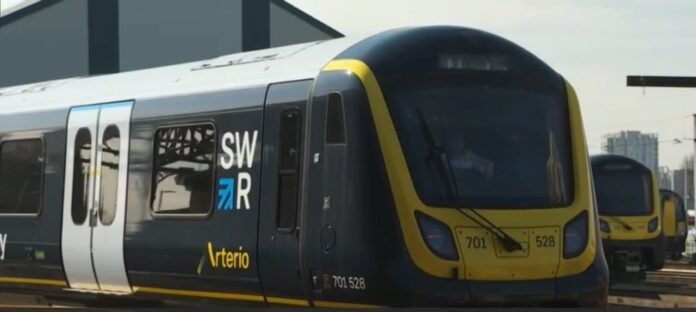Labour’s renationalised South Western Railway service starts amid optimism and challenges, signalling a shift to public control and reform
On Sunday, Britain marked a significant milestone in Labour rail renationalisation as the first publicly owned train service under the new government began operating. The 06:14 departure from London Waterloo to Shepperton was the inaugural rebranded journey, featuring a Union Jack and the slogan “Great British Railways: coming soon,” symbolising the return of South Western Railway (SWR) to public ownership.
However, the day was not without hiccups. The very first renationalised service of the morning—the 05.36 from Woking to Waterloo—was cut short, terminating at Surbiton due to ongoing bank holiday engineering works, requiring passengers to use a rail replacement bus.
Transport Secretary Heidi Alexander, who was present aboard the first renationalised departure, heralded the moment as the beginning of a “cultural reset” for Britain’s railways. She emphasised that this transition marks a decisive break from three decades of “inefficiency, delayed services and failing passengers.” The government aims to overhaul the industry through new legislation this year, integrating track and train operations under the new Great British Railways (GBR) entity, replacing the current split between Network Rail and private train companies.
SWR became the first franchise to return to public hands under the Passenger Railway Services (Public Ownership) Act 2024, passed shortly after Labour’s election victory. Alexander described the day as a watershed moment: “Moving confidently into a new era—the era of Great British Railways.”
She cautioned, however, that transformation will take time. “Public ownership isn’t a silver bullet, but we are firing the starting gun on the race for a truly 21st-century railway, focused on public good rather than private profit.”
Currently operated by the government-owned DfTO (Department for Transport Operator), SWR joins other publicly managed services such as LNER, Northern, TransPennine Express, and Southeastern—franchises brought back under government control due to previous financial or contractual failures. The remaining nine privately run franchises are expected to be renationalised by the end of 2027 as contracts expire, with the government projecting annual savings of £150 million in fees alone.
Alexander highlighted that the full benefits will be realised once GBR, expected to launch in early 2027, takes over comprehensive management of the network. She promised fewer cancellations, simpler ticketing, and a united railway “working as one team.” Regional services will earn the right to bear the GBR badge, symbolising a commitment to public service.
FirstGroup, which operated SWR since 2017, defended its record, citing “hundreds of millions of pounds of improvements” and continued innovation, including new fast Wi-Fi, even as it handed over control.
Conservative critics maintain that private companies have kept costs down, with Shadow Transport Secretary Gareth Bacon challenging Labour to deliver on promises of lower ticket prices and improved services.
Unions broadly support renationalisation and call for further steps. Aslef’s Mick Whelan described privatisation as “too far,” while RMT’s Eddie Dempsey acknowledged public ownership as progress but urged bringing all outsourced rail workers, including cleaners and security staff, fully into public employment without delay.
Sunday’s launch of the first Labour renationalised train service marks the start of a transformative era for British rail, with high hopes and significant challenges ahead as the government seeks to redefine the future of the network.
BBC
The UK government has taken South Western Railway (SWR) into public ownership, marking Labour’s first nationalisation of a train operator under its current administration. Transport Secretary Heidi Alexander stated she cannot guarantee fares will fall despite nationalisation, emphasising that train operations already cost taxpayers around £2 billion annually in subsidies. The focus will be on improving service and infrastructure rather than cutting ticket prices immediately. Public reaction has been mixed, with many questioning the benefit of nationalisation without cheaper fares, and some choosing alternative travel due to high costs. While other train companies have already been renationalised under previous governments, Labour plans to bring nearly all passenger rail services under public control by 2027. The creation of Great British Railways (GBR), set to oversee the network, awaits parliamentary approval. Rail unions welcome the move but call for further steps to bring outsourced staff under direct public employment.
SKY NEWS
South Western Railway (SWR) was renationalised early Sunday, marking the UK government’s first step toward creating Great British Railways (GBR), which will oversee rail services and infrastructure by 2027. The first SWR journey from Woking partly used a rail replacement bus due to engineering work, highlighting ongoing network challenges. Nationalisation means transferring control from private operators, who currently run rail franchises under fixed-term contracts, to public ownership. Transport Secretary Heidi Alexander described the change as “a new dawn for our railways” but acknowledged passengers primarily want reliable and efficient services rather than worrying about who runs the trains. Labour’s plan aims to improve service standards and better integrate the rail network under GBR. However, there is no immediate guarantee of cheaper fares or smoother journeys. Many passengers remain sceptical about nationalisation’s benefits, emphasising the need for improvements in punctuality and pricing. The government hopes GBR will bring long-term improvements across England’s railways.
